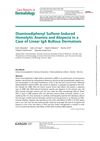 1 citations,
November 1995 in “Postgraduate medical journal”
1 citations,
November 1995 in “Postgraduate medical journal” A Saudi individual initially identified as a girl had a genetic disorder affecting gender development.
 2 citations,
July 2015 in “Case Reports in Dermatology”
2 citations,
July 2015 in “Case Reports in Dermatology” DDS treatment for LABD can cause severe side effects like anemia and hair loss, requiring careful monitoring.
 January 2025 in “Parasites & Vectors”
January 2025 in “Parasites & Vectors” Leishmaniosis was found in meerkats in Madrid wildlife parks, highlighting the need for more research and careful diagnosis.
 July 2019 in “The European research journal”
July 2019 in “The European research journal” RDW can be a useful marker for inflammation in alopecia areata patients.
 1 citations,
December 2016
1 citations,
December 2016 Researchers created a model to understand heart aging, highlighting key genes and pathways, and suggesting miR-208a as a potential heart attack biomarker.
 January 2015 in “Side effects of drugs annual”
January 2015 in “Side effects of drugs annual” The document concludes that sex hormones and related compounds have various effects on health, with both potential benefits and risks.
 December 2023 in “Research Square (Research Square)”
December 2023 in “Research Square (Research Square)” These specific gene polymorphisms are not linked to Alopecia Areata in Egyptians.
 August 2023 in “JOJ dermatology & cosmetics”
August 2023 in “JOJ dermatology & cosmetics” Antibiotics often cause skin reactions, making them a major health concern.
 3 citations,
June 2017 in “Methods”
3 citations,
June 2017 in “Methods” Researchers created a model to understand heart aging, highlighting the role of microRNAs and identifying key genes and pathways involved.
 11 citations,
June 2011 in “Expert Review of Dermatology”
11 citations,
June 2011 in “Expert Review of Dermatology” Skin reactions to drugs are common and can be deadly, usually requiring stopping the drug and may be better prevented with genetic testing in the future.
 29 citations,
September 2012 in “Dermatologic Clinics”
29 citations,
September 2012 in “Dermatologic Clinics” Hair disorders are caused by a complex mix of biology, genetics, hormones, and environmental factors, affecting hair growth and leading to conditions like alopecia.
 359 citations,
September 2017 in “European Journal of Epidemiology”
359 citations,
September 2017 in “European Journal of Epidemiology” The Rotterdam Study updated findings on elderly health, focusing on heart disease, genetics, lifestyle effects, and disease understanding.
 November 2020 in “Dubai medical journal”
November 2020 in “Dubai medical journal” Tofacitinib may effectively regrow hair in alopecia totalis patients.
 20 citations,
January 2021 in “GeroScience”
20 citations,
January 2021 in “GeroScience” Spermidine helps protect against aging by preserving telomere length.
19 citations,
June 2020 in “BMC Cancer” Trichilemmal carcinoma shares genetic changes with other skin cancers, suggesting similar causes and potential treatments.
 6 citations,
May 2020 in “Pharmacology Research & Perspectives”
6 citations,
May 2020 in “Pharmacology Research & Perspectives” A new gel form of minoxidil is equally effective for hair growth and safer for the heart and other organs than the traditional solution.
 19 citations,
January 2014 in “Facial plastic surgery”
19 citations,
January 2014 in “Facial plastic surgery” Dermabrasion improves skin appearance by removing the top layer to promote healing.
 May 2020 in “Research Square (Research Square)”
May 2020 in “Research Square (Research Square)” Trichilemmal carcinoma shares genetic traits with other skin cancers, suggesting similar treatment options.
 April 2020 in “Research Square (Research Square)”
April 2020 in “Research Square (Research Square)” Trichilemmal carcinoma shares genetic traits with other skin cancers, suggesting similar treatment options.
 7 citations,
May 2020 in “Trends in molecular medicine”
7 citations,
May 2020 in “Trends in molecular medicine” The document concludes that the immune-inhibitory environment of the hair follicle may prevent melanoma development.
 4 citations,
January 2005 in “Elsevier eBooks”
4 citations,
January 2005 in “Elsevier eBooks” Follicular Unit Transplantation is a precise hair restoration technique that requires careful planning and a skilled team, and Follicular Unit Extraction offers a less invasive option.
 53 citations,
October 1993 in “Drug Safety”
53 citations,
October 1993 in “Drug Safety” Oral retinoids can cause side effects ranging from mild to severe, including birth defects, and require careful monitoring and contraception.
 35 citations,
January 2019 in “Clinics in Dermatology”
35 citations,
January 2019 in “Clinics in Dermatology” Syphilis has a wide range of symptoms that can look like other diseases, and if not treated, it can progress to a more serious stage, especially in HIV-positive patients.
 9 citations,
March 2021 in “Hormones”
9 citations,
March 2021 in “Hormones” COVID-19 may affect male fertility and women might have better outcomes due to hormonal and immune differences.
 247 citations,
August 2011 in “European Journal of Epidemiology”
247 citations,
August 2011 in “European Journal of Epidemiology” The Rotterdam Study updated its design and objectives in 2012, providing insights into various diseases in the elderly, including skin cancer, bone health, liver disease, neurological and psychiatric conditions, and respiratory issues.
 219 citations,
September 2009 in “European journal of epidemiology”
219 citations,
September 2009 in “European journal of epidemiology” The Rotterdam Study aims to understand various diseases in older adults.
 23 citations,
December 2021 in “Frontiers in Immunology”
23 citations,
December 2021 in “Frontiers in Immunology” IL-1 family cytokines are crucial for skin defense and healing, but their imbalance can cause skin diseases.
 1 citations,
January 2021 in “Arthritis Research & Therapy”
1 citations,
January 2021 in “Arthritis Research & Therapy” About 8% of people with systemic lupus erythematosus have chronic scarring alopecia, with certain symptoms and positive antibodies increasing the risk, while immunosuppressants may lower it.
 38 citations,
October 1996 in “Dermatologic Clinics”
38 citations,
October 1996 in “Dermatologic Clinics” Certain hormone treatments can improve acne and related conditions in women.
 266 citations,
November 2013 in “European Journal of Epidemiology”
266 citations,
November 2013 in “European Journal of Epidemiology” The Rotterdam Study aims to understand disease causes in the elderly and has found new risk factors and genetic influences on various conditions.





























